Blockchain has recently emerged as one of the most sensational technologies of the 21st century. The technology is best known for its utilization in cryptocurrencies like Bitcoin and Ethereum that swiftly become a medium of exchange for goods and services.
There are also many other applications of blockchain technology, especially in the Fintech space such as cross-border payments, time-stamped transactions, anti-fraud systems, and many more.
Undoubtedly, this technology is revolutionizing the world, thus presenting tremendous business and career opportunities for those who embrace it early.
Hence, it would be optimal for everyone to learn Blockchain fundamentals to grasp this opportunity for a lifetime. Fortunately, you can learn all the fundamental principles from online courses and kickstart your journey right away.
However, this does not mean that you can take any random course. Most Blockchain courses are nothing more than a cash grab that you must avoid at all costs.
I decided to do the heavy lifting for you. This article will only feature the best courses that I find beneficial for building your blockchain knowledge and skills. You can then select the right course that suits your preferences and start learning right away.
Affiliate Disclosure: This article from Victory Tale contains affiliate links. We will receive a small commission from our partners if you enroll in the courses through them.
Nonetheless, we always value integrity and prioritize our audience’s interests. You can rest assured that we will present each course truthfully.
Things You Should Know
Blockchain Courses for Beginners VS for Developers
This article will feature two types of blockchain courses:
- Blockchain Courses for Beginners/Executives
- Blockchain Courses for Developers
The first type of training course will introduce beginners and executives to the world of blockchain. You will grasp how blockchain technologies work and how to apply them to your business. If you are interested in investing in cryptocurrencies, you will want to take one of these courses as well.
All the courses belonging to this group will be beginner-friendly. Thus, you will not need prior experience with blockchain or programming languages. Anyone who is not tech-savvy can take these courses.
Blockchain courses for developers are another story. These courses will train developers or those with solid programming experience to create private blockchain, write smart contracts, develop decentralized applications (Dapp), and many more.
Undoubtedly, these courses will have prerequisites as follows:
- Solid JavaScript experience – You should be comfortable with object-oriented programming, asynchronous JavaScript, and modern JavaScript features.
- Full Stack Web Development – You should have experience developing both the front-end and back-end of web applications. In other words, you should master one of the web development stacks such as MERN (MongoDB, Express, React, and Node.js) or be familiar with other relevant libraries and frameworks (Angular, Vue, etc.)
Suppose you don’t have a solid background in programming, but you really want to become a blockchain developer. In this case, I highly suggest you take web development courses to fulfill the prerequisites before proceeding to blockchain courses for developers.
Criteria
Below are the criteria for the best blockchain courses.
- Taught by credible instructors
- Available on a user-friendly learning platform
- Contain considerable amount of content (5 hours+)
- Offer excellent course materials
- Provide excellent value for money
- Receive mostly positive reviews from real students
- My personal experience with the course, instructor, and platform (if any) must be positive.
Important Note: As the blockchain industry is rapidly evolving, it is difficult (or even impossible) for online courses to catch up with the technology. Even though I cherry-pick all the courses, I cannot find one with no outdated content.
Hence, if possible, you should select the courses that have timely student support (such as Udacity and Getsmarter) so that the support team can provide the most up-to-date information and best practices.
Blockchain Courses for Beginners and Executives
1. Blockchain Technologies: Business Innovation and Application
This MIT program available on the Getsmarter platform is unarguably one of the best options if you are looking for a comprehensive blockchain course. You will learn from a team of faculty members at MIT Sloan.
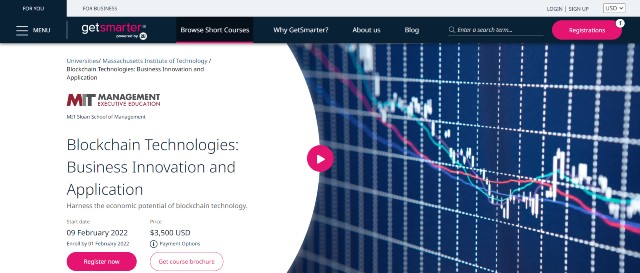
Course Content
This program comprises six modules, which you should complete one per week. Below is a summary of what you will learn from each module.
1. An Introduction to Blockchain Technology – The first module will discuss the foundations of blockchain technology and issues that blockchain can help solve or alleviate.
Later, you will identify the misconceptions of the technology and evaluate blockchain business applications using strategic frameworks.
2. Bitcoin and the Curse of Double-Spending Problem – The second module will drill deep into the background technology behind blockchain, including Bitcoin Protocol, Consensus Mechanisms, Proof-of-Work Algorithms, and how they can address the double-spending problem.
The second part of the course will cover Bitcoin’s challenges and explore other cryptocurrencies that may address them.
3. Costless Verification: Blockchain Technology and the Last Mile Problem – The third module will explain how blockchain can help us achieve more economical and reliable verification.
You will first explore the current issues of settlement and reconciliation of transactions. Subsequently, you will learn how to build data integrity with costless verification.
The second part of the course will discuss the last mile problem. You will then investigate and evaluate feasible solutions to help solve it.
4. Bootstrapping Network Effects Through Blockchain Technology and Cryptoeconomics – The fourth module will discuss how blockchain can play a role in reducing networking expenses. You will also learn about smart contracts and how they can change the nature of intermediation.
Subsequently, the module will go in-depth into tokens. You will perceive how they can empower the platform’s growth, operations, and security.
5. Using Tokens to Design New Types of Digital Platforms – The fifth module will cover fundamental concepts of the ICO landscape. You will grasp the various roles of tokens, including general benefits to the ecosystem and funding blockchain innovations and platforms.
The second part of the course will discuss issues with securities regulation that can impede the successful tokenization of an ecosystem.
6. The Future of Blockchain Technology, AI, and Digital Privacy – The final module will articulate how blockchain can interact with other emerging technologies, particularly AI and IoT. Later, you will produce a primer for blockchain solutions to a chosen business problem.
From an overall perspective, this program will approach blockchain technology from a holistic, managerial view. It will not drill deep into the technical or programming aspects.
Instead, it will focus on blockchain use cases and applications to traditional businesses, hence optimal for managers, entrepreneurs, and executives.
There will be numerous quizzes and projects that you can complete to practice and obtain the necessary hands-on experience in each module. Hence, you will become more skilled and comfortable crafting blockchain solutions to real-world business problems upon program completion.
This program takes six weeks to complete. MIT expects 5-8 hours of weekly commitment. I think the pace is manageable for most students with full-time employment.
Regarding tuition fees, this program costs $3500 one-time. However, there are various payment options you can opt for, including paying in installments.
If you are still unsure whether this program is right for you, I highly suggest you download the course brochure to grasp more information regarding course format and course content.
Pros & Cons
Pros
- Unarguably one of the best blockchain courses for beginners, entrepreneurs, and executives
- Learn from six renowned MIT Sloan professors
- Approach blockchain technology from a strategic and managerial perspective
- Feature numerous real-world examples
- Provide wide ranges of interactive content, including video lectures, live polls, infographics, and many more
- Interact with peers through class-wide forums and small group discussions, hence providing networking opportunities
- The student support team is available for students to ask questions
- Self-paced learning
- Receive a certificate from MIT Sloan upon program completion
Cons
- Far costlier than other alternatives
- The learning environment would be formal, which may not be suitable for some learners.
- The program has a fixed start date. Hence, it will be available only for some periods of the year.
2. Professional Certificate in Blockchain for Business
This edX program from the Linux Foundation is one of the best options for students who want to adopt blockchain technology for their business.
You will learn from a team of blockchain entrepreneurs, developers, and technology advisors and grasp the impact of this technology on the corporate world.
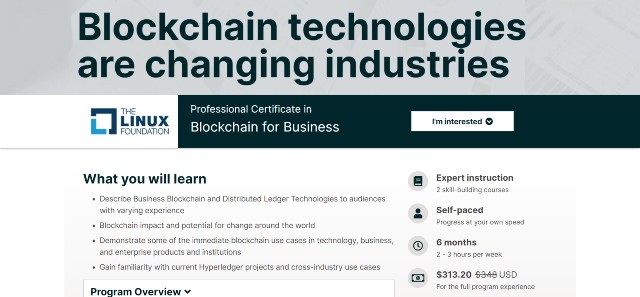
Course Content
This program consists of two courses as follows:
1. Blockchain: Understanding its Uses and Implications – The first course will explain in detail what Blockchain is. You will grasp the characteristics and mechanics of this transformative technology and understand how it revolutionizes the world.
Later, the course will drill deep into use cases. You will learn about how blockchain technology influences several core industry groups such as banking, supply chains, and many more.
The second part of the course will explain smart contracts, which are the building blocks of blockchain transactions. You will then perceive how blockchain helps overcome unsolvable issues of the past.
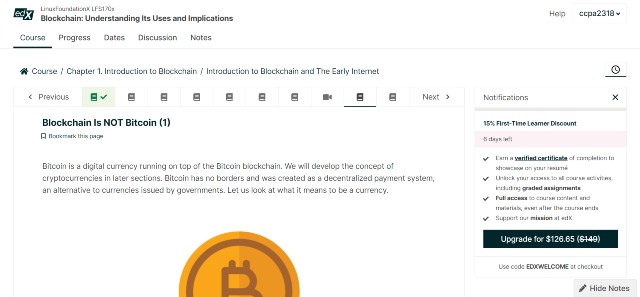
2. Introduction to HyperLedger Blockchain Technologies: The second course is all about hyperledger technologies, which are created by the Linux Foundation itself. You will learn about hyperledger tools and libraries and grasp their prominent use cases.
The course content is text-based. Although there are a few short videos, you will learn mostly through readings and completing assignments. However, this does not mean that you will go through a boring wall of texts. Instead, the readings are easy-to-read and informative.
The Linux Foundation recommends spending 2-3 hours on the course, and you will complete it in 6 months. Based on my observation, most students can complete it much sooner.
Free auditing is available, but you may want to opt for a full program experience ($313) to access all the assignments and a digital certificate.
Pros & Cons
Pros
- Learn hyperledger technologies from the Linux Foundation, the organization that creates the technology
- Provide numerous real-world examples for students to analyze
- Straightforward explanations of various use cases
- Easy-to-read readings and transcripts
- Self-paced learning
- Free auditing
Cons
- Since this program consists of text-based blockchain training courses, it may not be optimal for some students.
3. Professional Certificate in Blockchain Fundamentals
This professional certificate program from UC Berkeley offered on the edX platform will guide you through all the concepts and actual use cases of blockchain technology.
You will also learn about cryptocurrencies’ specific mechanics, which may help you make better trading decisions.
Course Content
This program consists of two minor courses as follows.
1. Bitcoin and Cryptocurrencies – This first course will guide you through the cryptocurrency space focusing on Bitcoin. You will learn about its basic properties, background mechanics, and practical applications.
Subsequently, the course will discuss the cybersecurity aspect of Bitcoin. You will perceive how cybercriminals use network attacks to steal crypto assets or mine them maliciously.
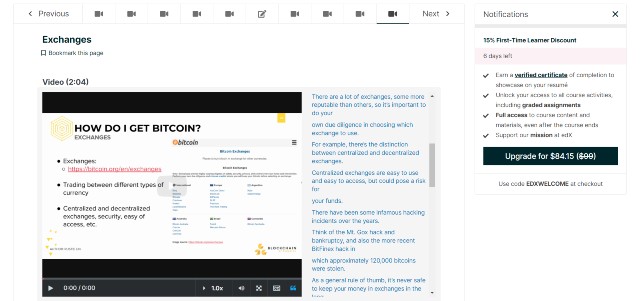
2. Blockchain Technology – The second course will introduce you to blockchain technology. It will cover a wide range of topics such as the CAP Theorem and the Byzantine Generals Problem.
The second part of the course will explore cryptonomics. You will explore how enterprises and companies implement blockchain technologies. You will also learn about the obstacles to blockchain adoption and the government’s attempts to regulate blockchain and cryptocurrencies.
Overall, this program will explain the architecture of this phenomenal technology in detail without drilling too deep into the technicals. Hence, students with different backgrounds can easily understand the course content.
Regarding the pace, the course page indicates that you should spend 3-5 hours on the program, and you will complete it in three months.
However, based on my observation, you can complete it much faster since all video lectures are short (1-6 minutes long). You will spend most of your class time on readings and assignments (verified track only).
You can audit all the courses for free, while the verified track that grants access to graded assignments and a digital certificate costs $178. I suggest sticking to a free audit because the course content is too short and apparently not worth the price.
Pros & Cons
Pros
- The program receives official endorsements from Blockchain-related institutions (Cosmos and IBM Blockchain).
- Beginner-friendly curriculum (does not go too in-depth into the technicals)
- Clear explanations of blockchain concepts and applications
- Easy-to-read transcripts
- Self-paced learning
- Free auditing
Cons
- Overall, the course content is too short to justify paying for the verified track.
4. Fintech: Blockchain for Business and Finance
This Fintech course from the University of Texas at Austin is an excellent way to learn about blockchain adoption in the financial sector. You will learn from Cesare Fracassi, a professor of finance and director of the blockchain initiative at his university.
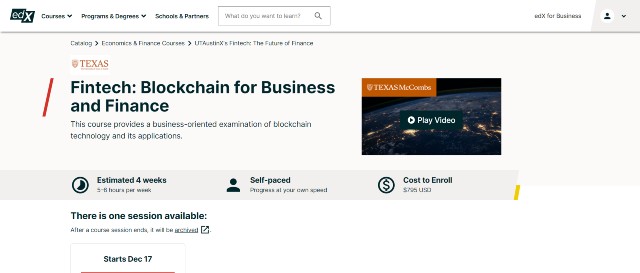
Course Content
This course contains third sections as follows:
1. Cryptography – The first section will explain the fundamental concepts of cryptography. You will learn about hashing functions, encryption, and other relevant topics. All of these are beneficial in helping you understand the background process of blockchain technology.
2. Distributed Ledgers – The second section will go in-depth into distributed ledgers. You will learn how these technologies can be instrumental in creating and validating transactions.
3. Business Applications – The third section will discuss business applications of blockchain technology with an emphasis on financial services. You will learn about digital wallets, exchanges, and other blockchain applications.
Overall, you will learn all the key elements of the technology and obtain insights into its use cases, particularly in finance.
Regarding the pace, you should spend 5-6 hours on the course, and you will complete it in 4 weeks.
Unlike most other courses and programs on edX, you cannot audit this course. You need to enroll in the verified track, which costs $795, to access it.
Note: This course is part of UT-Austin’s Fintech program. You can enroll in the entire program and get a 10% discount on all four courses, including this one.
Pros & Cons
Pros
- Learn from a professor at a renowned US university
- Well-structured curriculum
- Detailed explanations of blockchain concepts and use cases
- Finance-focused
Cons
- Costly blockchain course
- Free auditing is NOT available.
5. Blockchain Revolution Specialization
Created by INSEAD, a leading European business school, this Coursera specialization will guide you through the fundamentals of blockchain technology. You will learn from Don Tapscott, a renowned expert on business innovation and technology.
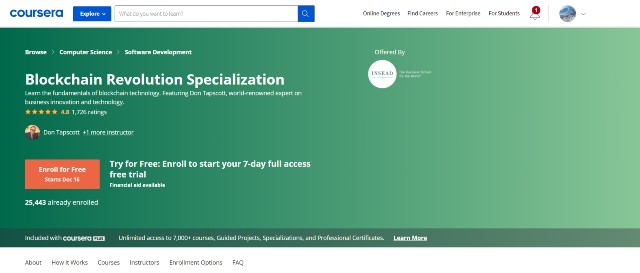
Course Content
This specialization comprises four minor courses as follows:
1. Introduction to Blockchain Technologies – The first course will provide you with foundational knowledge of blockchain technologies. You will understand how blockchain works and why it is revolutionary.
Subsequently, you will also learn about core terminologies such as mining, hashing, proof-of-work, double-spend problem, and blockchain design principles. Finally, you will also grasp the challenges the blockchain ecosystem faces.
2. Transacting on the Blockchain – The second course will discuss the inefficiencies of financial intermediaries in facilitating the control and movement of money and financial assets.
You will then learn how blockchain transactions can help clear out these inefficiencies and make future transactions faster and more distributed than before.
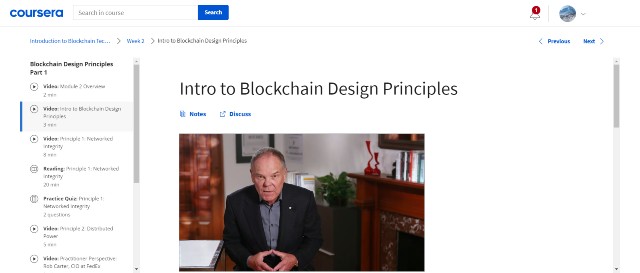
3. Blockchain and Business: Applications and Implications – The third course will drill deep into the impact of blockchain on business operations, organizations, and management. Later, you will explore different layers of blockchain technology stacks and perceive how they affect the blockchain systems.
4. Blockchain Opportunity Analysis – This course is project-based. You will identify one specific problem or issue in any chosen industry and investigate potential blockchain solutions to it.
To complete this project, you can use Blockchain Case Commons, a crowdsourced solution of blockchain applications and use cases.
I appreciate the curriculum of this specialization. It is comprehensive, covering all key concepts that absolute beginners need to know. Furthermore, it is also equipped with a real-world project that tests your knowledge and may benefit your future endeavors.
Regarding the pace, INSEAD recommends spending 4 hours per week on the program for five months.
You can audit all the minor courses for free. However, if you want to access graded assignments, peer reviews, and a digital certificate, you need to enroll in the full course that costs $59 per month.
Alternative Program
If you are a finance professional, you may want to opt for another specialization from INSEAD: Blockchain Revolution in Financial Services.
This specialization will primarily cover the same content as the above program. However, it will approach the subject from a financial perspective, which will be more suitable for finance professionals.
Pros & Cons
Pros
- Learn from a world-renowned expert in business innovation
- Comprehensive curriculum that covers all fundamental aspects of blockchain technologies and their applications
- One final large-scale project to complete, which you can later use to pitch ideas to your organization or potential investors
- Clear explanations of concepts and terminologies
- Free auditing
Cons
- Some parts of the course content are outdated.
- Several students reported that the instructor was too aggressive in advertising his own book.
6. Bitcoin and Cryptocurrency Technologies
If you are looking for a blockchain course that focuses on cryptocurrencies, this course from Princeton University is probably one of the best available.
You will learn how Bitcoin functions at a technical level and what differentiates it from the current medium of exchange and other cryptocurrencies.
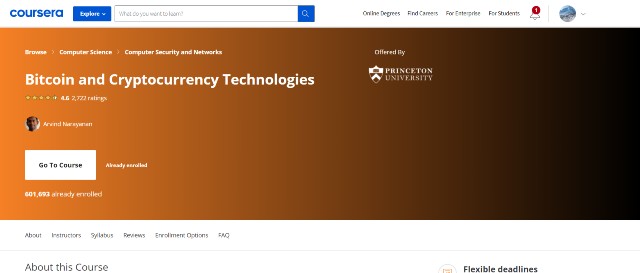
Course Content
Below is a summary of topics that you will learn from the course.
- Introduction to Cryptographic Building Blocks and Cryptocurrencies
- Bitcoin Consensus Mechanism and Security
- Bitcoin Mechanics (Transactions, Scripts, Blocks, and peer-to-peer networks)
- Bitcoin Mining and Digital Wallets
- The anonymity of Bitcoin and other cryptocurrencies
- Bitcoin as a platform
- Altcoins and alternative cryptocurrencies
- and many more
As mentioned above, this course will focus on Bitcoin and cryptocurrencies. You will learn all of their crucial mechanics. Thus, you can use this knowledge to make better crypto investments or gain extra income from mining.
Most students spend approximately 23 hours on the course. Regarding pricing, you can audit the course or purchase the complete course for $49. However, weirdly, many students do not receive a digital certificate upon completion. Therefore, I would suggest you stick to the auditing option.
Pros & Cons
Pros
- Excellent blockchain course with an emphasis on Bitcoin and cryptocurrencies
- Easy-to-follow curriculum
- High-quality video lessons
- Clear explanations of concepts
- Free auditing
Cons
- The transcripts are pretty difficult to read.
- Students reported that they did not receive a digital certificate upon completion.
- Programming assignments are too challenging for many students who are absolute beginners.
7. Blockchain: Foundations and Use Cases
If you want a more concise course on blockchain foundations, this course from Consensys, a leading blockchain company, is another good choice. You will learn from a team of experts at Consensys Academy who provide insights into this revolutionary blockchain technology.
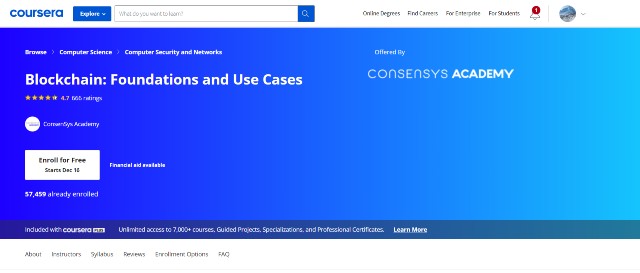
Course Content
The course content is concise. Most students complete the course within ten hours. Below is a summary of the topics that you will learn in this course.
- Blockchain Foundations – History of blockchain and decentralization, Ledgers, Distributed Ledgers, etc.
- Cryptography, Hash Functions, Public Key Cryptography, and other Blockchain technical terminologies
- Trust Framework and Consensus Mechanisms
- Blockchain limitations and misconceptions
- Implications of blockchain on traditional businesses
- Cryptocurrencies, Smart Contracts, Tokens, Wallets, Marketplaces, etc.
- Use Cases: Self-Sovereign Identity, Reputation, Ownership, Governance, Supply Chain and Asset Tracking, etc.
Compared to other alternatives, this course is very concise. However, it covers all foundational blockchain concepts that beginners need to know. If you are looking for a crash course, I suggest giving this course a try.
You can purchase this course at $99 to access graded assignments. Nonetheless, I think its content is not informative enough to justify the price. It would be best if you stick to free auditing.
Pros & Cons
Pros
- Learn from experts from a leading blockchain company
- Beginner-friendly curriculum
- Engaging lessons with high-quality video presentations
- Clear explanations with up-to-date examples
- Free auditing
Cons
- The full course is expensive considering that you can finish the whole thing in 10 hours.
- Some students believed that ConSensys was too aggressive in promoting itself in the course.
Blockchain Courses for Developers
8. Become a Blockchain Developer
This Nanodegree program from Udacity is one of the best options for experienced programmers to learn about blockchain development. You will learn from a team of veteran blockchain architects, software developers, and software engineers.
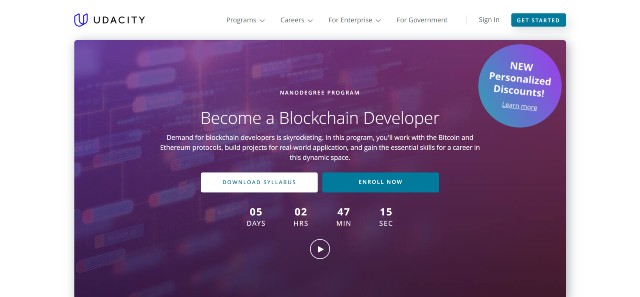
Course Content
The program comprises four minor courses and one capstone project as follows:
1. Blockchain Fundamentals – The first course will introduce you to blockchain’s core components and protocols. Subsequently, you will create and manage identity on the Bitcoin blockchain and establish proof of ownership.
In the second part of the course, you will use Node.js and Leveldb to build your own blockchain and start encoding and decoding digital assets on it. Finally, you will verify the owners using a digital identity.
2. Ethereum Smart Contracts, Tokens, and Dapps – The second course will drill deep into smart contracts. You will learn about Ethereum fundamentals and use development tools to build, compile, deploy and test smart contracts.
The second part of the course will explore Solidity, a popular programming language for writing smart contracts. You will then use Solidity to create a fungible token on Ethereum.
3. Blockchain Architecture – The third course will guide you through blockchain architecture. You will learn how to provide blockchain solutions and handle privacy, security, and maintenance issues.
4. Dapp with Autonomous Smart Contracts and Oracles – This course will explain how to develop a decentralized application (Dapp) with smart contracts to handle transactions.
5. Capstone – The capstone project is where you will use all the knowledge you have learned. You will create a decentralized property listing application from scratch.
Besides the capstone, you will have the opportunity to gain hands-on experience from completing assignments, quizzes, and real-world projects in each section. In total, you will complete as many as five projects, which is far more than any other online course has yet offered.
The suggested pace for this program is more intense than average blockchain courses. You should expect to spend ten hours per week or even more on the courses. At this pace, you will finish the program in four months.
However, since the entire program is self-paced, you can craft your study schedule and pace. Just keep in mind that if you lag behind the suggested pace, you will need to pay extra tuition fees (see below)
Student Support
Students who enroll in this Nanodegree program will gain access to the three following types of student support.
Technical Mentor Support – With the Udacity learning platform, help is all around. If you get stuck, you can use the chat interface on Student Hub to ask technical questions to your mentor at any time (24/7). In most cases, you will receive a reply within less than an hour.
Furthermore, if you have specific requirements, you can also ask a mentor to create a custom study plan for you.
Unlimited Project Reviews – You can ask industry experts to review your work, provide feedback, and inform you about best practices that you can use to improve it further. Since Udacity allows unlimited requests, you can request project reviews whenever you need them.
It is crucial to note that all Udacity projects are challenging even to experienced programmers. Therefore, this support will prove extremely useful in developing your blockchain skills.
Like the technical support, you will receive feedback within 1-3 hours.
Career Services – Once you complete the program, you can request the career services team to review your resume, LinkedIn profile, and Github portfolio to ensure that they meet professional standards. This would help increase the chance of receiving interview invitations from top blockchain companies.
Pricing
This program costs $399 monthly. However, you can choose to buy a 4-month bundle and receive a 15% discount, lowering tuition fees to $339 per month.
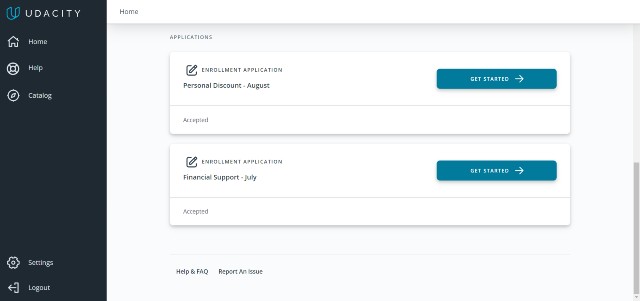
If you are a new student, you are eligible for personalized discounts. Once you create an account, you can access the code, which will reduce tuition fees by up to 75%. Therefore, you may enroll in this top-notch program by paying lower than $100 per month.
[sc name=”udacity” ][/sc]Pros & Cons
Pros
- Undeniably one of the best blockchain courses online for developers
- Learn from a team of industry experts
- Informative, in-depth lessons
- Complete as many as five challenging real-world projects that you can add to your Github portfolio to showcase your skills
- Timely mentor support + Unlimited project-reviews
- Career services are a big plus.
Cons
- Some interviews included in the program are outdated.
- Costlier than other alternatives
- Projects can be highly challenging.
9. Linux Foundation’s Blockchain Learning Path
Apart from the edX program that I recommend, Linux Foundation also provides additional courses on blockchain technologies. These include a full-fledged learning path that paves the way for its students to become proficient blockchain developers.
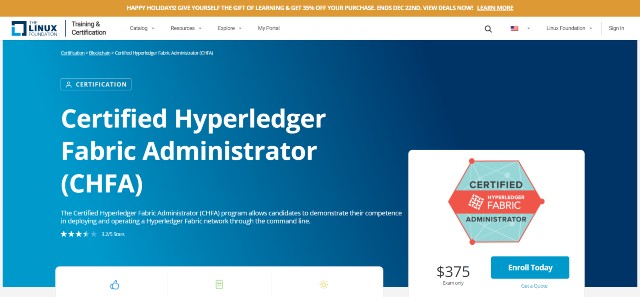
Note: This learning path will start with two courses included in the edX program. If you have completed it, you can start with Course 3 below.
- Blockchain: Understanding its Uses and Implications
- Introduction to Hyperledger Blockchain Technologies
- Introduction to Hyperledger Sovereign Identity Blockchain Solutions – You will learn how Hyperledger Aries, Indy, and Ursa can add a layer of trust to the internet. Additionally, you will create independent digital identities rooted in blockchain networks
- Becoming a Hyperledger Aries Developer – In this course, you will learn in-depth about Hyperledger Aries and how to use this technology to develop blockchain-based identity apps.
- Hyperledger Besu Essentials – Creating a Private Blockchain Network – This course will equip you with the skills to use Hyperledger Besu to build blockchain networks and deploy Dapp to them.
- Hyperledger Fabric for Developers – The course will explain how to use Hyperledger Fabric to write Chaincode and create enterprise-level blockchain applications.
- Certified Hyperledger Fabric Developer – This certification course will equip you with all the skills for the CHFD exam. You will learn about all the processes of using Hyperledger Fabric to develop, manage, and maintain client applications and smart contracts.
- Hyperledger Fabric Administration – The eighth course is for system administrators who want to drill deeper into how to manage the Hyperledger Fabric network effectively.
- Certified Hyperledger Fabric Administrator – This certification course will prepare you for the CHFA exam. In essence, you will learn to deploy and operate a Hyperledger Fabric network through a command line.
From the list, there are two blockchain certification courses (Course 7 and Course 9). You can take the exams upon completion. These exams will incur extra fees, but they are optional. If you want blockchain certifications to strengthen your career profile, taking the exams would be a wise decision.
Unlike other alternatives, not all courses from the Linux Foundation have videos. You will learn from text-based lessons and through completing lab-based assignments.
If you are familiar with video lessons, you will find these text-based lessons very dull, though all text-based explanations on the course are concise and easy to understand.
I find this learning path the best option among all courses available if you want to learn Hyperledger technologies and relevant tools.
This is because all the courses are informative (packed with 10-30 hours of course content) and provide lab-based exercises for students to obtain hands-on experience.
Regarding pricing, the first five courses are available on edX. Hence, they are free to audit. You can opt for a verified track for $149-$199 (varied by courses).
On the other hand, Course 6 and Course 8 cost $299, while both certification courses are priced at $375. If you want to take an exam, you must pay an additional $200 in exam fees.
Pros & Cons
Pros
- Contain the most detailed courses on Hyperledger technologies, including two blockchain certification training programs
- Well-structured curriculum
- Informative, in-depth lessons
- Lab-based assignments are available for students to gain hands-on experience
- Free auditing is available for Course 1-5
Cons
- Text-based lessons, which may not be optimal for some students
Coursera Plus
As this article covers several courses and specializations on Coursera, you may be interested in enrolling in more than one of them. In that case, I suggest subscribing to Coursera Plus instead.
By paying only $399 per year ($33.25 per month on average), you will be able to access all 3000 courses and specializations on Coursera (entire course, not just audit) without the need to subscribe and pay individually for each program you enroll.
From another perspective, the average fees you pay for Coursera Plus are even cheaper than the individual subscription fees for any specialization (costs $39-$79).
Hence, Coursera Plus provides excellent value for money. If you are a studious student, don’t hesitate to opt for Coursera Plus now.
[sc name=”coursera” ][/sc]Other Alternatives
Below are other alternatives that you might want to consider. However, all of these courses have issues that prevent me from including them in the list.
Blockchain and FinTech: Basics, Applications, and Limitations – This edX course from the University of Hong Kong will guide you through the design rationale behind the blockchain and unveil high-potential opportunities provided by blockchain platforms.
I chose not to recommend this course because it barely touches the Fintech aspect of blockchain despite its name. Furthermore, the majority of course content consists of video recordings of guest speakers, which will not provide the best learning experience.
Blockchain Specialization – This Coursera specialization from the University of Buffalo will explain how blockchain revolutionizes decentralized application programming and steps to develop and create smart contracts and Dapps.
This specialization mainly covers the same content as Udacity’s but in a far less in-depth manner. The best thing about this course is that there are numerous hands-on exercises that help you understand the concepts in no time.
Still, I decided not to recommend this specialization because most of its content is outdated.
LinkedIn Learning – LinkedIn Learning has various short courses on Blockchain basics and relevant technologies (NFT, Dapps, etc.) However, most of the courses are outdated, which may not be optimal for taking.
PluralSight – PluralSight offers multiple short blockchain-related courses. However, most of its courses are outdated (they received last updates back in 2018-2019).
Related Courses
Below are lists of the “best courses” that some learners who want to continue their learning in blockchain development might find helpful.
Defi – coming soon
Solidity – coming soon